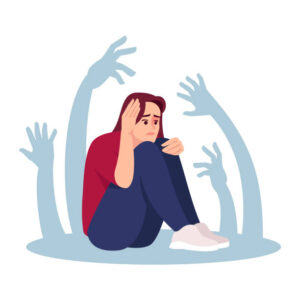Belle. That was the name I gave to my imaginary best friend back in 4th grade, during my Disney obsession phase. I had just shifted to a new school and had no friends. We’d host elaborate tea parties together, I’d confide in her about my day, and even seek her advice on what now seem like trivial matters. Later, as I opened up to other people and made new friends, she faded away. However, when I transitioned to a different school in 9th grade, Belle returned. This time, she seemed more mature. I no longer played tea parties with her but I sat and ranted about how difficult studies were and the about the woes that befall every teenager. She didn’t fade away this time and it was easier for me to talk to her rather than talk to real people.
We often label individuals as “anti-social” when they’re struggling with anxiety. This anxiety can stem from a fear of meeting new people, engaging in conversations, and facing potential judgment. This overwhelming fear can lead them to withdraw or avoid social interactions altogether. It’s crucial to understand that this behaviour isn’t a deliberate avoidance of social interaction, but rather a reflection of internal battles with anxiety.
The dictionary definition of social anxiety is “An extreme fear of humiliating or embarrassing oneself in social situations” but it’s so much more than that. It is being in a crowded room with your heart racing. Your palms become clammy, and a knot forms in your stomach, twisting tighter with each passing moment. The voice in your head is that of a critic who on somedays whispers in your ear while on somedays it screams and yells at you. It is the art of overthinking the impression one hasn’t even made yet.
STIGMA
Social anxiety can be traced back to ancient times, with early descriptions by Hippocrates in the 4th century B.C. Hippocrates referred to it as ‘shyness’, describing individuals who were inclined to “love darkness as life” and who believed that “every man observes him.” These observations suggest a recognition of social anxiety-like symptoms, reflecting an ancient understanding of the condition’s manifestations.
It’s important to understand that people dealing with social anxiety aren’t ‘just shy’. These individuals may be dismissed as simply needing to “come out of their shell” or “be more outgoing,” without recognizing the depth of their anxiety and the impact it has on their daily lives. As a result, people with social anxiety may feel invalidated or overlooked, exacerbating their feelings of isolation and alienation. Social anxiety is a merciless jailer, its prison walls forged not of iron but of cruel insecurities and haunting doubts, keeping its victims shackled in a cycle of isolation and self-doubt.
Moreover, the anxiety and pressure individuals with social anxiety feel around people can lead to avoidance behaviour and other unhealthy coping mechanisms. Avoidance becomes a tempting strategy to ease immediate discomfort, but it ultimately reinforces the cycle of anxiety and perpetuates the stigma surrounding social anxiety. This avoidance can take place in forms such as skipping social events, declining invitations, or even withdrawing from relationships altogether.
Social anxiety is not a character flaw or a personality trait but a mix of genetic, psychological and environmental factors. Reducing it to mere shyness belittles the daily battles faced by individuals contending with this challenge.
IMPACT ON STUDENTS
Students are plagued with a myriad of fears, including fear of failure, fear towards professors, and fear of challenging subjects. For individuals coping with social anxiety, there’s an added fear of interacting with others. This form of anxiety can profoundly impact students, creating a learning atmosphere that impedes their academic progress. Consequently, they may experience feelings of isolation, alienation, diminished self-esteem, and reduced confidence. Moreover, social anxiety can hinder students from expressing themselves and participating actively, causing them to miss out on valuable educational and social opportunities.
In the classroom, social anxiety can act as a hindrance to participation, hindering students from speaking up, asking questions, or engaging in group activities. The fear of drawing attention to oneself or being judged by peers can lead to a reluctance to seek help or clarification, ultimately impeding academic progress and creating a sense of inadequacy.
The constant worry about social interactions can detract from focus and concentration, making it challenging to absorb information or perform well academically. In extreme cases, social anxiety may even lead to school avoidance or dropout, robbing students of valuable opportunities for growth and development.
COPING MECHANISMS
Starting with a conversation on mental health can help create awareness, as it is crucial to remember that there is no one-size-fits-all treatment for this condition. What works for one person may not work for another. One valuable tool for coping with social anxiety is cognitive-behavioural therapy (CBT). This therapeutic approach helps individuals identify and challenge negative thought patterns and behaviours associated with social anxiety. Through CBT, individuals learn to reframe irrational beliefs, develop coping strategies for anxiety-provoking situations, and gradually expose themselves to feared social scenarios in a supportive environment.
When you are struggling with social anxiety, it’s important to practice self-compassion. Be kind to yourself and give yourself grace, as you would do with someone you love who is suffering. The more supportive of yourself you are, the less you’ll turn to self-criticism and harsh judgments. This shift in mindset can help you cope better and build greater resilience. Spend time on activities that nourish your mind, body, and soul such as exercise, meditation, creative expression, and connecting with nature to recharge your energy levels.
Building a support network of trusted friends, family members, or mental health professionals can also provide invaluable support for individuals struggling with social anxiety. A safe space can be important when coping with social anxiety. It provides an environment where you can express your fears and share experiences without judgment or criticism. Finding a community that understands and supports you through difficult moments can be immensely beneficial. Having a safe space to express yourself, vent your frustrations, and receive encouragement can go a long way in helping you cope
CONCLUSION
For those who are struggling with the above, I know it may feel like your anxiety or nervousness may be protecting you. An anxious mind will always find something to be afraid of, it is only when we step in and speak that we set ourselves free. Remember, you are the main character of your life, not a sidekick. And to those who might have friends who are dealing with social anxiety, sometimes a hug can do wonders. Now that I have a supportive family and encouraging friends who don’t judge me even if I make a bad pun, Belle has disappeared, for the better this time.



















